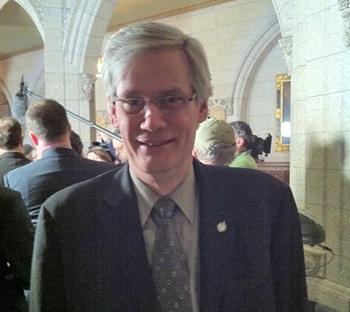Bill C-389, which would add gender identity to Canada’s human rights law, has been moved up on the House of Commons’ Order Paper, thanks to NDP MP Olivia Chow. The final hour of debate will now take place in the morning on Monday, Feb 7, with the third-reading vote on Wednesday, Feb 9.
“With all the election speculation, it’s important to get the trans bill voted on at third reading and have it done just in case there’s an election,” Chow says. “There might not be, but you never know. Also, Bill is not running again, and I want to make sure that the trans bill becomes law, and that will be part of his legacy.”
Chow’s own private member’s bill, a “once in a lifetime” immigration sponsorship bill, takes Siksay’s previous spot for debate in early March.
“I just wanted to make sure that the Senate has ample time to approve the [trans] bill so there’s no excuse, even in the off chance there’s an election,” Chow says.
According to Siksay, this was a swap with almost no negotiation; he says the process was easy. However, the accelerated timeframe means there’s less time for lobbying other MPs to support the bill.
“My sense is people are pretty clear where they’re going on this,” Siksay says. “We had the one vote already; the vote was clear, so I’m not anticipating much of a change from that. I do worry about absences and who’s going to be there and who’s not when it’s such a close vote, so that could change the result.
“I’m nervous, but I’m still cautiously optimistic.”
Liberal MP Hedy Fry, who has been a vocal supporter of the bill, is happy the date has been brought forward.
“I’m glad it’s being pushed up because every time we delay bills that have to do with fundamental justice and fundamental equality, those people remain unequal and have no justice,” Fry says. “It’s important. It’s a private member’s bill, and I can’t speak for other Liberals, but I do know that most of the Liberals I’ve spoken to think it’s a good bill.”
Fry reiterates her own experiences in dealing with trans people as a Vancouver physician.
“I have seen the tragedy, and what bugs me most about it is that this is in the DSM — this is in medical books, and these people don’t have access to drugs that they need. Many of them have to go to other countries; they have butcher jobs done on them,” Fry says. “They’re not seen. This is discrimination as far as I’m concerned, when you look at saying some people, where there’s a medical diagnosis, can’t have their work done.
“For me that’s the biggest piece, this inability for people to have drugs and the services that they need. We know about the discrimination; we know about the way that people feel about them, but the other part is just a lack of access to justice and medical care.”
The next hurdle, assuming C-389 passes the vote Feb 9, will be the Senate. Siksay has only just begun consultations on the process of shepherding the bill through the Upper Chamber.
“No volunteers yet; no sponsor yet, but hopefully we’ll have that before too long, if we get to that point. I really hope we do.”
Fry says the bill hasn’t yet come up as a topic of discussion with Liberal senators in caucus, but she is confident they will be supportive.
“This is the same Senate caucus that discussed same-sex marriage when Mr Chretien was soundly behind that,” Fry says. “This is part of what we did as Liberals when we were in government. We moved the agenda forward for the GLBT communities — but we didn’t get the T quite in, so this is that part that needs to be looked at.”


 Why you can trust Xtra
Why you can trust Xtra


